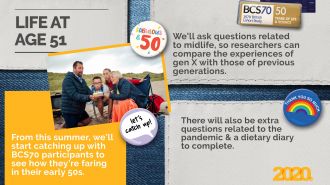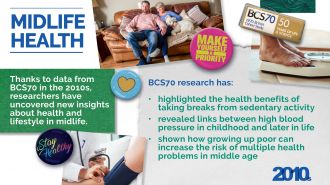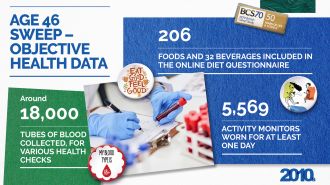
- Our studies
- Our research
- Publications and resources
- Data access and training
- About
- News
- Events
- Get in touch
- Join our mailing list

Welcome to our news and blogs section. Here you’ll find the latest developments and insights from across our longitudinal studies.
UCL and the University of Bristol are to lead the Population Research UK (PRUK) co-ordination hub, part of an existing strategic investment from the UKRI Infrastructure Fund.

More than one in three British adults are suffering from two or more chronic health conditions in middle age, such as recurrent back problems, mental ill-health, high blood pressure, diabetes, and high-risk drinking, according to UCL researchers.

Researchers can now access new information on the presence of COVID-19 antibodies among more than 10,000 study members taking part in the four cohort studies run by the UCL Centre for Longitudinal Studies (CLS).

This project aims to examine the experiences of care leavers who became parents (of cohort members) and the intergenerational impact on their children’s outcomes.

Researchers can now access new information about how the COVID-19 pandemic impacted the lives of almost 28,000 cohort study participants during the third national lockdown in February and March.

Researchers from around the world have been using CLS study data to tackle important questions. Here is a round-up of over 70 new pieces of research that we’ve added to the CLS bibliography between January and March 2021.

The Centre for Longitudinal Studies (CLS) is to launch a new UK-wide study that will test approaches to setting up a full large-scale national birth cohort study in the future. The study team is calling for input from future data users as it develops its plans for the two-year feasibility study.

From this summer, we hope to start catching up with our BCS70 participants to see how they’re faring in their early 50s.

Children conceived through medically assisted reproduction who are born small do just as well in cognitive tests during childhood and adolescence as naturally conceived children who are born a normal weight, finds a new study led by UCL researchers.

Our initial findings from the Millennium Cohort Study Age 17 Sweep cover a range of themes, including mental health, obesity, substance use and antisocial behaviours.

Researchers from around the world have been using CLS study data to tackle important questions. Here is a round-up over 40 new pieces of research that we’ve added to the CLS bibliography between October and December 2020.

Findings from the 1970 British Cohort Study’s Age 46 Biomedical Sweep have helped to improve our understanding of midlife health.

The 1970 British Cohort Study Age 46 Sweep had a significant biomedical focus, with objective health measurements and assessments being conducted for the first time in the cohort members’ adulthood.
Ryan Bradshaw
Senior Communications Officer
Phone: 020 7612 6516
Email: r.bradshaw@ucl.ac.uk